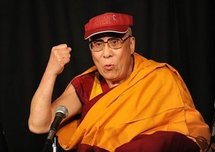
Tibetan spiritual leader the Dalai Lama speaks during a press conference after the first of his teaching sessions at Radio City Hall in New York.
Marxism has "moral ethics, whereas capitalism is only how to make profits," the Dalai Lama, 74, said.
However, he credited China's embrace of market economics for breaking communism's grip over the world's most populous country and forcing the ruling Communist Party to "represent all sorts of classes."
Capitalism "brought a lot of positive to China. Millions of people's living standards improved," he said.
The Dalai Lama, giving a series of lectures at the Radio City Music Hall in central Manhattan until Sunday, struck a strikingly optimistic note in general, saying that he believed the world is becoming a kinder, more unified place.
Anti-war movements, huge international aid efforts after Haiti's earthquake this year, and the election of Barack Obama as the first black president in a once deeply racist United States are "clear signs of human beings being more mature," he said.
The Dalai Lama said he felt a "sense of the oneness of human beings," jokingly adding: "If those thoughts are wrong, please let me know!"
Although China, which forced him to escape for his life in 1959, is loosening up, he had harsh words for a communist leadership that he said still seeks to rule by fear.
As Chinese become richer, "they want more freedoms, they want an independent judiciary, they want to have a free sort of press," he said.
The Chinese government, he said, seeks harmony, "but harmony must come out of the heart, not out of fear. So far, methods to bring harmony mostly rely on use of force."
Asked why tickets to his lectures are selling for as much as hundreds dollars, the Dalai Lama said none of the money went to him personally. "You should ask the organizer. I have no connection."
He said he was "always asking the organizer: tickets must be cheap. For myself, I've never accepted a single dollar like that."
Some of the money goes to charities, such as hunger relief, he said. "Unfortunately," he added, bursting into his trademark laughter, sometimes the "organizations are a little richer."
------------------------------------------------------------------------------------
However, he credited China's embrace of market economics for breaking communism's grip over the world's most populous country and forcing the ruling Communist Party to "represent all sorts of classes."
Capitalism "brought a lot of positive to China. Millions of people's living standards improved," he said.
The Dalai Lama, giving a series of lectures at the Radio City Music Hall in central Manhattan until Sunday, struck a strikingly optimistic note in general, saying that he believed the world is becoming a kinder, more unified place.
Anti-war movements, huge international aid efforts after Haiti's earthquake this year, and the election of Barack Obama as the first black president in a once deeply racist United States are "clear signs of human beings being more mature," he said.
The Dalai Lama said he felt a "sense of the oneness of human beings," jokingly adding: "If those thoughts are wrong, please let me know!"
Although China, which forced him to escape for his life in 1959, is loosening up, he had harsh words for a communist leadership that he said still seeks to rule by fear.
As Chinese become richer, "they want more freedoms, they want an independent judiciary, they want to have a free sort of press," he said.
The Chinese government, he said, seeks harmony, "but harmony must come out of the heart, not out of fear. So far, methods to bring harmony mostly rely on use of force."
Asked why tickets to his lectures are selling for as much as hundreds dollars, the Dalai Lama said none of the money went to him personally. "You should ask the organizer. I have no connection."
He said he was "always asking the organizer: tickets must be cheap. For myself, I've never accepted a single dollar like that."
Some of the money goes to charities, such as hunger relief, he said. "Unfortunately," he added, bursting into his trademark laughter, sometimes the "organizations are a little richer."
------------------------------------------------------------------------------------









 Home
Home Politics
Politics









